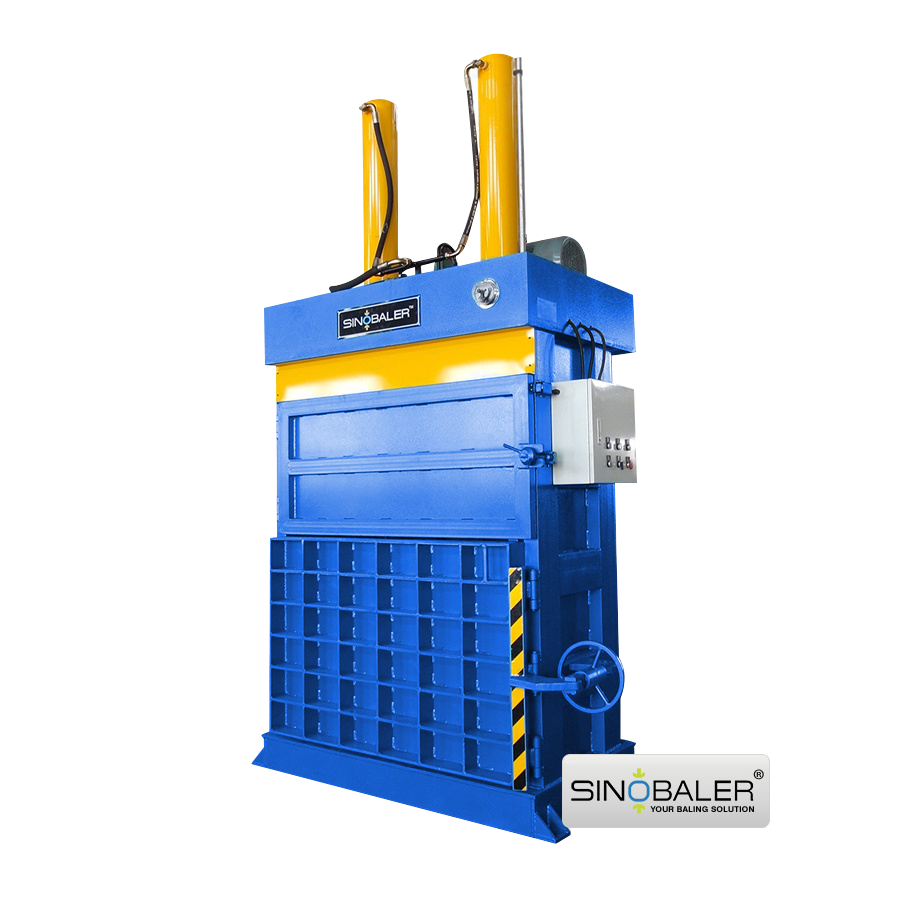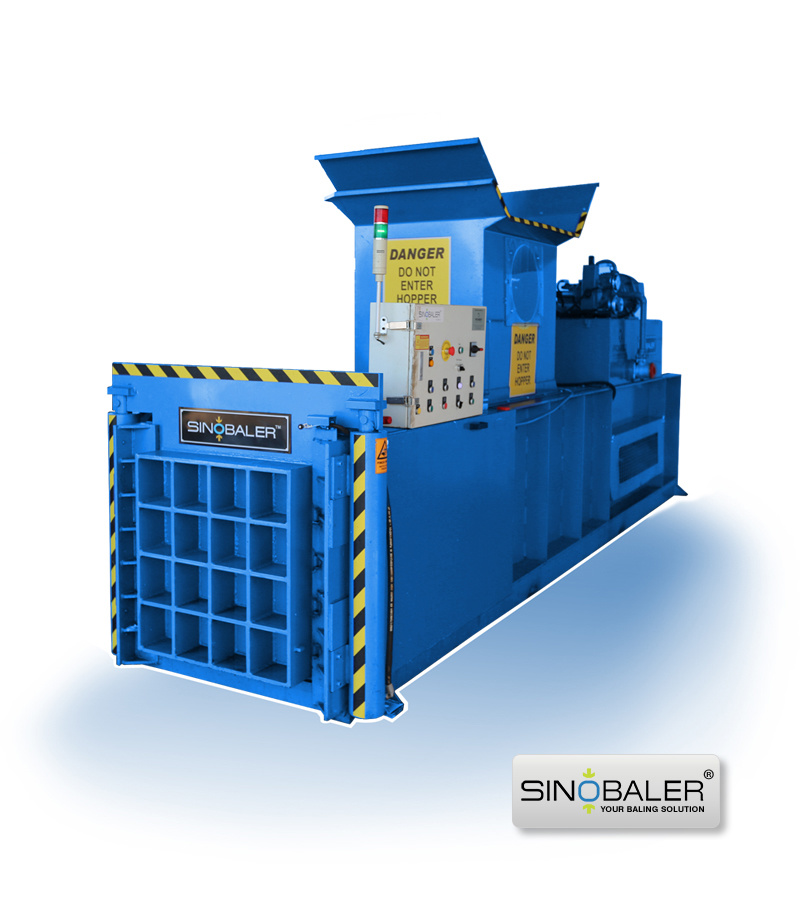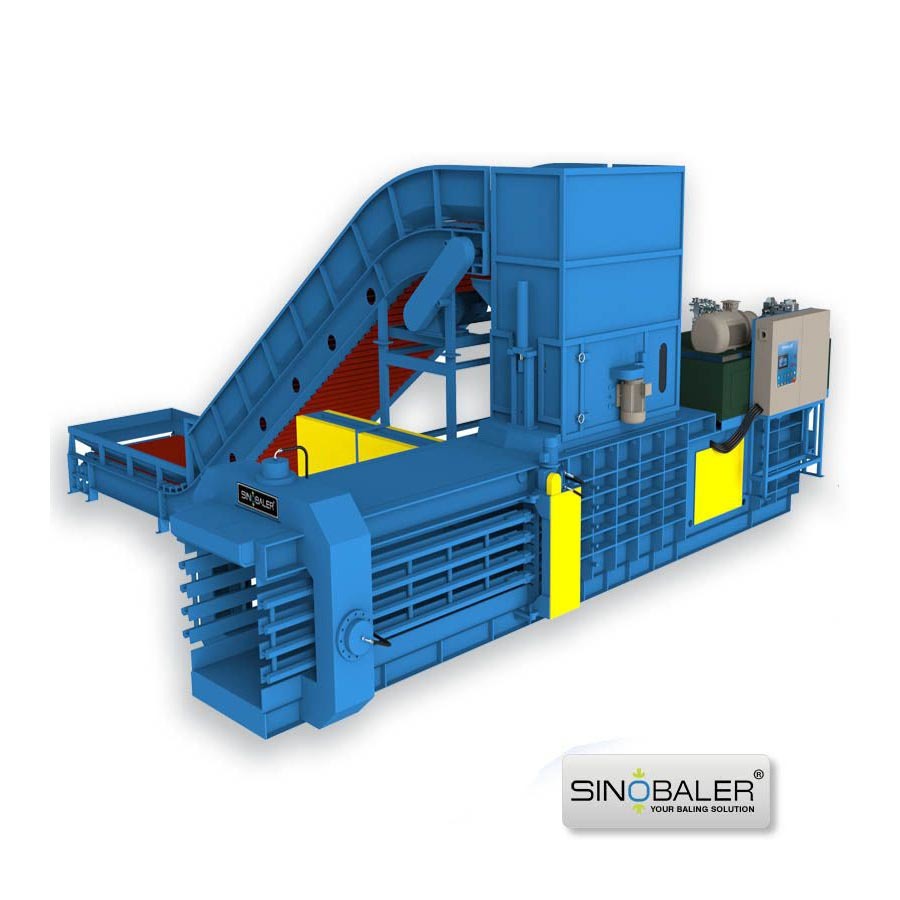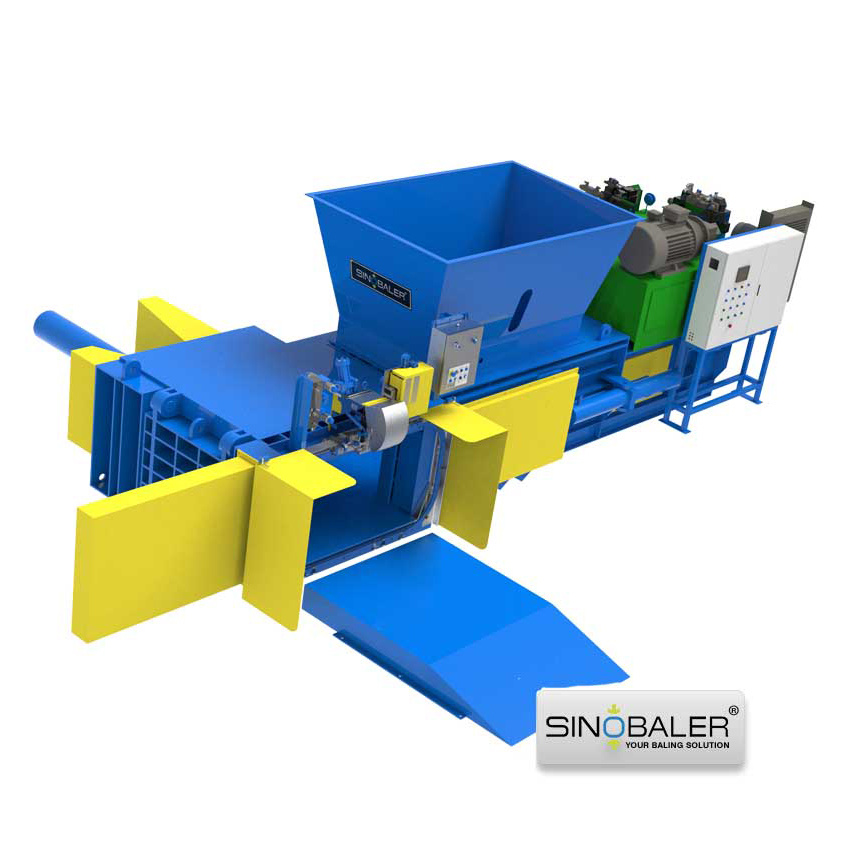Alfalfa / Lucerne
Alfalfa, also known as Lucerne, is a high-protein forage crop widely used for feeding livestock, especially dairy cattle, horses, and rabbits. It's rich in fiber, vitamins, and minerals, making it a staple in animal nutrition. Alfalfa is typically harvested and dried into hay, which is then baled for storage and transportation. Alfalfa / Lucerne baler is an essential piece of agricultural equipment designed to harvest and compress hay materials—such as alfalfa, clover, and grasses—into compact bales. These bales facilitate easier storage, transport, and utilization of hay products. Alfalfa balers come in various types, including small square, large square, and round balers, each catering to different farming needs.
🚜 Types of Alfalfa Balers
Alfalfa balers come in various types, each suited to different scales of operation and bale preferences:
1. Small Square Balers
- Description: Produce compact, rectangular bales typically weighing between 20 to 30 kg.
- Ideal For: Small farms, horse owners, and operations requiring manageable bale sizes.
- Advantages: Easy to handle manually, suitable for storage in barns or sheds.
- Considerations: Labor-intensive and less efficient for large-scale operations.
2. Large Square Balers
- Description: Produce large, rectangular bales weighing between 300 to 500 kg.
- Ideal For: Medium to large farms with sufficient storage and handling equipment.
- Advantages: Higher efficiency, reduced labor, and better suited for mechanized feeding systems.
- Considerations: Require appropriate storage facilities and equipment for handling.
3. Round Balers
- Description: Produce cylindrical bales, often wrapped in netting or twine.
- Ideal For: Large-scale operations and areas with limited storage space.
- Advantages: Can handle wetter conditions better and are easier to transport.
- Considerations: May result in higher leaf loss compared to square bales.
✅ Benefits of Using an Alfalfa Baler
1. Enhanced Waste Reduction
By baling agricultural by-products like alfalfa and other hay materials, farmers can effectively reduce waste. This practice minimizes the need for landfills and burning, promoting sustainable farming practices.
2. Environmental Sustainability
Recycling hay materials through baling reduces pollution levels and supports eco-friendly farming techniques. It ensures that agricultural waste is repurposed rather than discarded, contributing to a healthier environment.
3. Increased Productivity
The efficient processing and recycling of hay materials lead to increased productivity in agricultural businesses. By utilizing waste products, farmers can enhance their overall output and profitability.
4. Cost-Effectiveness
Using an alfalfa baler is a cost-effective method for recycling agricultural products. It reduces the need for manual labor and minimizes waste disposal costs, offering significant savings for farmers.
5. Energy Efficiency
Alfalfa balers are designed to be energy-efficient, reducing the pressure on natural resources like fuel. Their efficient operation ensures that energy consumption is kept to a minimum.
🛠️ Applications of Alfalfa Baling
The byproducts of the compressing and compaction process achieved by the alfalfa baler can be used for various purposes:
- Animal Feed: Baled hay serves as a nutritious feed for livestock.
- Animal Bedding: Compressed hay bales can be used as bedding material for animals.
- Raw Materials for Industries: Processed hay can be repurposed as raw materials for other industries.
These applications demonstrate the versatility and importance of alfalfa balers in modern agriculture.
⚠️ Considerations When Choosing a Baler
- Bale Size and Weight: Ensure the baler produces the desired bale size and weight suitable for your operation.
- Storage Capacity: Consider the space available for storing the bales.
- Handling Equipment: Ensure you have the necessary equipment to handle and transport the bales.
- Budget: Balance the cost of the baler with the expected return on investment.
Quick links:
VIDEOS









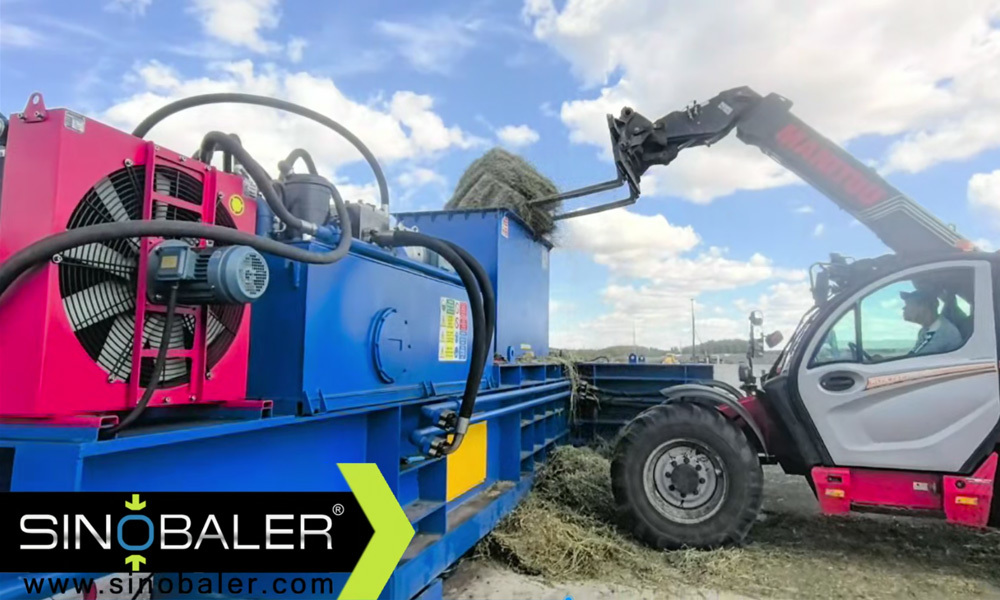
PICTURES
Similar Applications
APPLICABLE MACHINE
The Sinobaler Heavy Duty Dual Ram Baler delivers 80–200 tons of press force via its dual-ram system, ideal for compacting tough, fibrous, or rebounding materials, as well as soft ones requiring high bale density for optimized loading. It's perfect for natural and synthetic fibers, metal panels, tubes, profiles, and hard plastics like electronics shells and pipes. This baler reduces storage space, cuts transport costs, and boosts efficiency—making it a smart investment for modern recycling and waste handling.
Vertical Bagging Baler Machine
Vertical bagging baler machines are perfect for compressing and bagging small, loose materials for easy handling and transport. They press materials into compact bales and bag them in one step, ideal for factories handling pet food, animal bedding, fertilizers, fabrics, and more. Suitable materials include peanut shells, cotton seeds, chopped straw, hay, wood shavings, fibers, and rice hulls. One person can produce up to 30 bales per hour, each weighing 44–66 lbs. The removable bag feature adds versatility, allowing the machine to bale other materials without bagging when needed.
Scale Weighing Horizontal Bagging Baler
Scale weighing horizontal bagging baler is ideal for packing loose materials like rags, straw, hay, wood shavings, pet food, and textile scraps. Commonly used in pet food plants, farms, fertilizer factories, and recycling centers, it helps turn loose waste into valuable, bagged bales. Equipped with PLC control, one-button operation, and a hopper sensor switch, it can produce 25kg bales (700×400×310mm) at up to 60 bales/hour. The built-in scale ensures precise bale weight. It automatically compresses, bags, and ejects materials for easy handling, storage, and transport.
Heavy Duty Horizontal Bagging Machine
One main use of a horizontal baling and bagging machine is for loose materials like sawdust, wood chips, rags, peanut shells, cotton seeds, and rice hulls. These are hard to handle, but this machine automatically feeds, compresses, and bags them for easier storage, transport, or resale. Sinobaler’s Horizontal Baling & Bagging Machine features PLC control, one-button operation, and a safety sensor switch. It produces 60 bales/hour (88 lbs each, 28×16×12 in). Ideal for textile recyclers, pet food plants, farms, fertilizer factories, and any site generating loose waste.
A biomass bagging baler is an industrial machine designed to compress loose biomass materials and pack them into bags for convenient storage, handling, and transportation. It is widely used in biomass power plants, agricultural processing facilities, waste-to-energy projects, and recycling centers. By reducing volume and stabilizing loose biomass, bagging balers help improve logistics efficiency and protect materials from moisture and contamination.
Sinobaler’s Manual Tie Horizontal Baler, also called a semi-automatic horizontal baler, handles solid and hollow waste like cardboard, PET bottles, textiles, and more. Ideal for facilities processing under 4 tons/hour with low labor costs, it offers automatic feeding, compressing, door control, and bale ejection—only the tying is manual. Press force ranges from 40 to 120 tons, with bale weights from 200kg to 850kg. Custom chamber sizes, power packs (up to 45kW), and conveyor options are available to boost productivity up to 5 bales/hour.
Open-end Manual-tie Horizontal Baler
Sinobaler SHB1-O series open-end manual-tie horizontal baler features an open-end design for continuous bale output, improving productivity by 50% over close-end balers. Strapping setup is needed only once, saving labor like a fully automatic baler. It supports various strapping materials—steel wire, PET strap, rope, etc.—making it ideal for high-volume solid waste or biomass baling. Not suited for hollow plastics due to lower density. A cost-effective choice for mid-scale recyclers or facilities needing efficient, labor-saving baling with limited investment.
Open-end Manual-tie Horizontal Baler With Wire Threader
This open-end manual-tie horizontal baler with wire threader offers nearly all functions of a fully automatic baler—except automatic tying. The built-in threading mechanism pushes wire or belt into strapping slots automatically, unlike standard manual-tie balers. While its productivity is about 20% less than a full-auto baler of the same size, it allows flexible strapping materials like steel wire, PET belt, or rope. Ideal for medium-scale recyclers or producers of solid waste, animal bedding, or feed who need efficient, cost-effective baling without sharp metal in bales. Best suited for soft or solid waste, not hollow plastic containers.
Fully Automatic Horizontal Baler
Sinobaler’s fully automatic horizontal baler (20–120 tons pressure) processes up to 15 tons/hour, ideal for high-volume recyclers handling cardboard/OCC, paper, plastic film, textile waste, and more. As our flagship open-end auto-tie baler, it features Mitsubishi PLC control, remote support, and simple operation. Bale weight/length is programmable via a touch screen for optimized container loading. The SHBA2-1200 model produces dense 1200kg rectangular bales, easy for transport/storage. CE-compliant with safety interlocking, SHBA2 is the perfect solution for large-scale soft waste recycling.
L-type Two Ram Automatic Horizontal Baler
The L-type two ram automatic horizontal baler is ideal for baling a wide range of recyclable waste. Compared to single ram balers, it offers greater versatility, supports both wire and plastic strapping, and produces high-density bales thanks to its separate strapping unit. Its flexible design can include features like a pre-compression lid to prevent cutting sensitive materials like textiles. Perfect for high-volume recycling centers, fodder exporters needing plastic straps, and municipal waste handlers seeking to avoid jams common in single ram balers.
PRIVACY POLICY
We collect information from you when you fill out an inquiry or contact form. When submitting the form on our site, you may be asked to enter your name and contact details such as: e-mail address, mailing address and/or phone number, etc. Alternatively, you can choose not to complete our forms and visit our site anonymously. Any of the information we collect from you may be used to help us to better respond to your individual needs, and/or enable us to more effectively respond to your customer service requests and support needs. The email address you provided may also be used to send you information and updates pertaining to your inquiry and/or order, in addition to receiving occasional company news, updates, related product or service information, etc. SINOBALER does not sell, trade, or otherwise transfer to outside parties your personally identifiable information. This does not include trusted third parties who assist us in operating our website, conducting our business, or servicing you, so long as those parties agree to keep this information confidential. We may also release your information when we believe release is appropriate to comply with the law, enforce our site policies, or protect ours or others rights, property, or safety.
By using our site, you consent to our online privacy policy. If we decide to change our privacy policy, we will post those changes on this page. If you have any questions or concerns regarding our privacy policy, please e-mail info@sinobaler.com or mail your question to us at 1206 Yinzhou Shanghui Nan Lou, 1299 Yinxian Avenue, Yinzhou District, Ningbo 315192, P.R. China.
EXTERNAL LINKS & DISCLAIMER
Our web site has links to many other organizations with their permission. Upon leaving the SINOBALER web site, you are subject to the privacy policy of the new site which are not under our control. SINOBALER is not responsible for the content of any linked site or any link contained in a linked site. These links are provided to you as a service for you to better understand the different business relationships that SINOBALER has established, and/or to point the reader to other possible relevant resources.



































